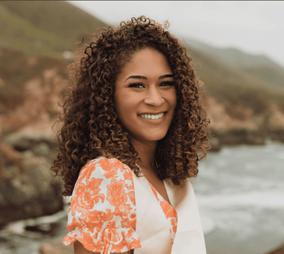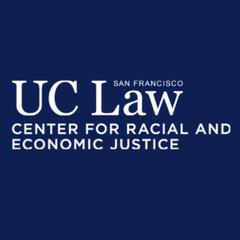




The Center for Racial and Economic Justice (CREJ) works to advance equity through legal education, scholarship and collaboration. CREJ enriches UC Law SF by providing our intellectual community with access to nationally renowned thinkers on issues of racial and economic inequality and the space to critically examine how the law reinforces subordination.
CREJ’s three primary avenues for achieving its mission are:
Reframing conventional doctrinal course instruction by situating cases and jurisprudence within a historical and structural context of racism and inequality;
Convening scholars and practitioners to disseminate information and facilitate dialogue on issues of racial and economic injustice; and
Coordinating course offerings and other educational opportunities that center critical perspectives of race, identity, and inequity through which UC Law SF students develop a deeper understanding of the complexities of racism and subordination.

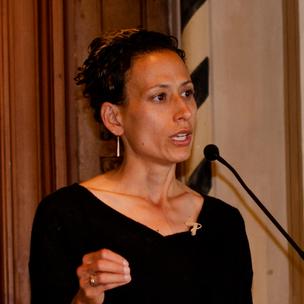

Dear Community,
With the closing of another academic year, the Center for Racial and Economic Justice (CREJ) is reflecting on the milestones and achievements we have experienced alongside our colleagues
As you will read, our programs this year have been instrumental in furthering our commitment to racial equity Whether it was engaging in a fireside chat with Leah Goodridge on professionalism as a racial construct (p 4), hosting a panel discussion with queer restorative and transformative justice practitioners (p 5), or organizing an all-day symposium on racial justice lawyering with breakout sessions facilitated by UC Law students (p 5), our focus on interrogating systems of oppression and fostering spaces for co-creating justice-led alternative visions has remained steadfast. We also proudly celebrate the accomplishments of CREJ-affiliated faculty members, such as Ascanio’s recognition as the 2024 Ellmann Awardee (p. 7) and Prithika’s appointment to the tenure-track faculty at UC Law (p. 8).
We extend our heartfelt gratitude to the UC Law staff, student research fellows, panelists, speakers, and attendees whose participation and support have been integral to the success of CREJ programs. The dedication and support from so many within our UC Law community inspires us to continue this vital work
As we turn our gaze towards the next academic year, we humbly ask for your renewed support of and active engagement with CREJ May the year ahead be filled with hope, access, and dignity for all
In solidarity, Faculty
Co-Directors
Center for Racial and Economic Justice
Balakrishnan
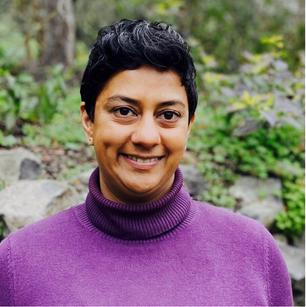
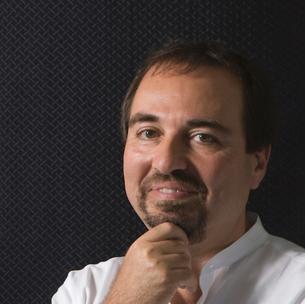


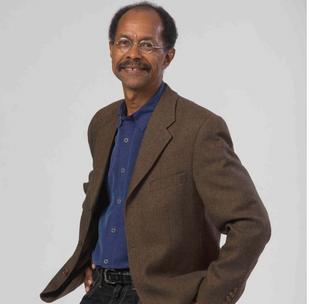


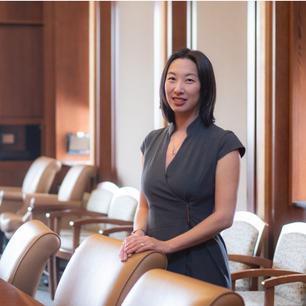
Visiting CREJ’s Wiley Manuel Professor Jerry López spoke to students and faculty about his vision of a transformed at UC Law SF. He invited the audience to imagine the convictions and the aspirations of this transformed law school. Professor López described lawyering as a “stylized version of human problem solving” and transformation as an ongoing process that is never finished. He challenged the audience to be thoughtful that “the things that you see that do not change are living and choosing to remain the same. Do not think of them as dead.” In his opening, Professor López reminded the room of the importance of relationships and reflected on his relationships with Justice Wiley Manuel and Keith Wingate, namesakes for CREJ’s visiting professorships. He honored their visions for the legal profession and how they embodied “letting your life speak.” López described how their lives continue to speak to him.

Leah Goodridge delivered a lecture on the themes explored in her recent UCLA Law Review article, where she examines the concept of professionalism within the legal profession. She argues that ostensibly raceneutral norms are often used to regulate people of color in the workplace, as these standards may be rooted in racial subordination. Her presentation also discussed strategies to challenge and disrupt professionalism standards when they disproportionately disadvantage people of color.
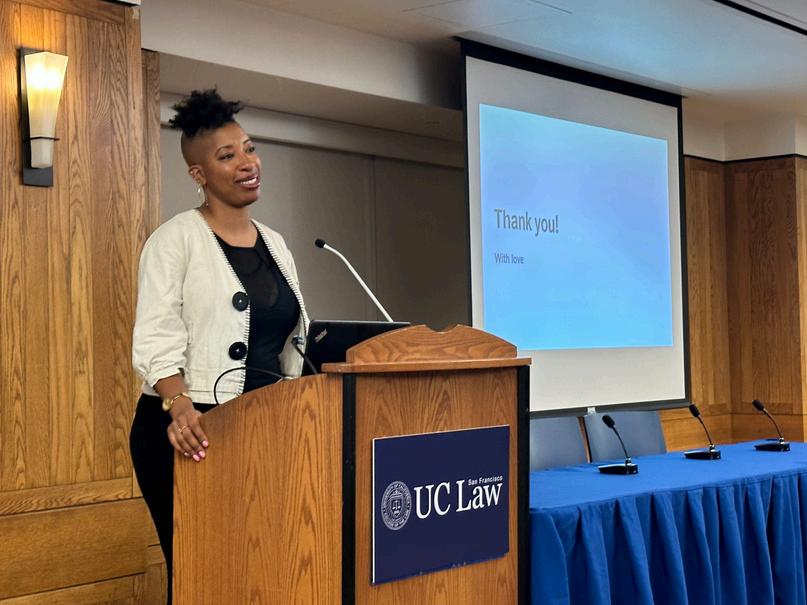
Students, faculty, and community members came together for a full day of engaging, critical dialogue. The first panel of the day focused on Rebellious Lawyering. Panelists discussed how they practice the law as a way to build community power, transform current systems, and change the world. Professor Zamir Ben-Dan encouraged the audience to disrupt the criminal justice system and think outside the box. He reminded us that “we are not here to make the system work well” when the system was not designed to encourage change and freedom. Panelists also discussed the evolution of rebellious lawyering approaches and the need to remove the lawyer’s ego from a movement and center the client or community’s visions for a different world
The second panel of the day focused on Restorative Justice The panelists discussed restorative justice as a way to reclaim and transform the legal profession When we begin to see ourselves and colleagues as students and teachers simultaneously and reject the victim/criminal paradigm, we can build a new system together Panelist Tiff Miller shared how restorative justice allowed them to get back in touch with their humanity, saying “by humanizing ourselves and our clients, we can work through the interpersonal conflicts that often stall community organizing and change.” Lastly, student-led breakout sessions at the end of the day allowed symposium participants to consider applying rebellious lawyering and restorative justice frameworks to UC Law’s campus in tangible approaches.
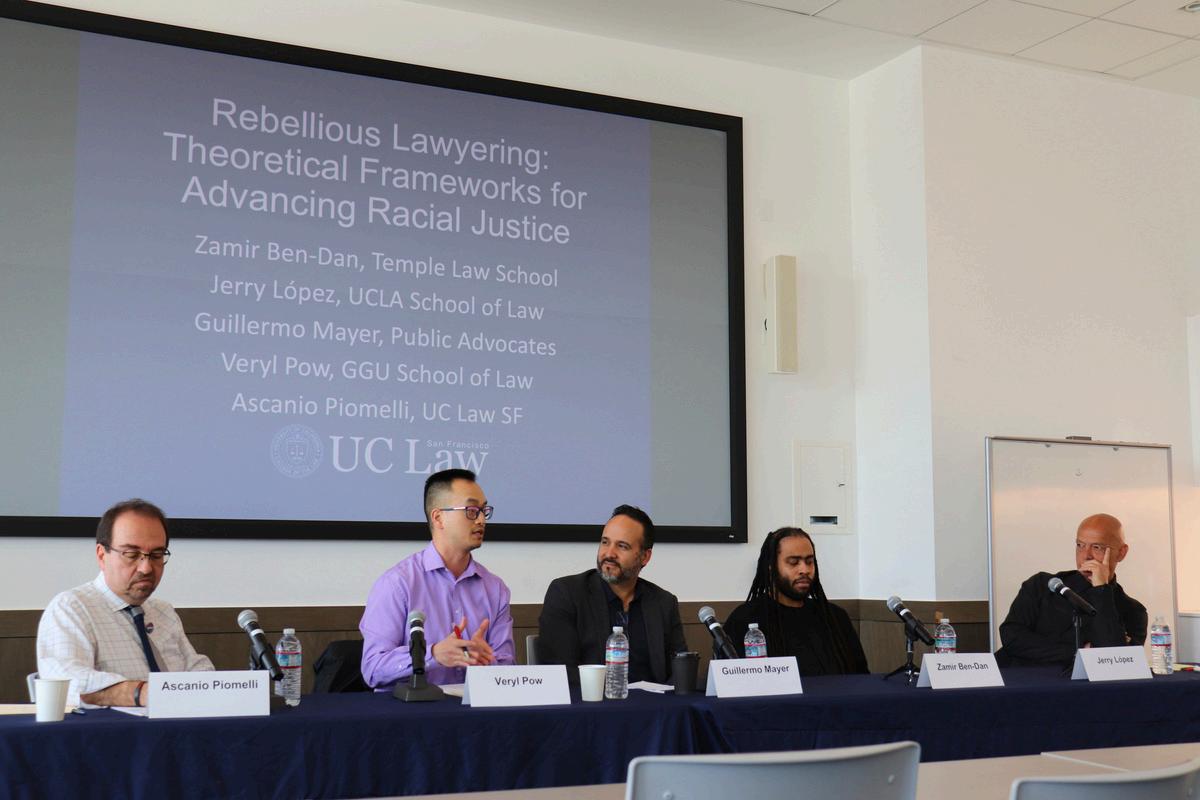

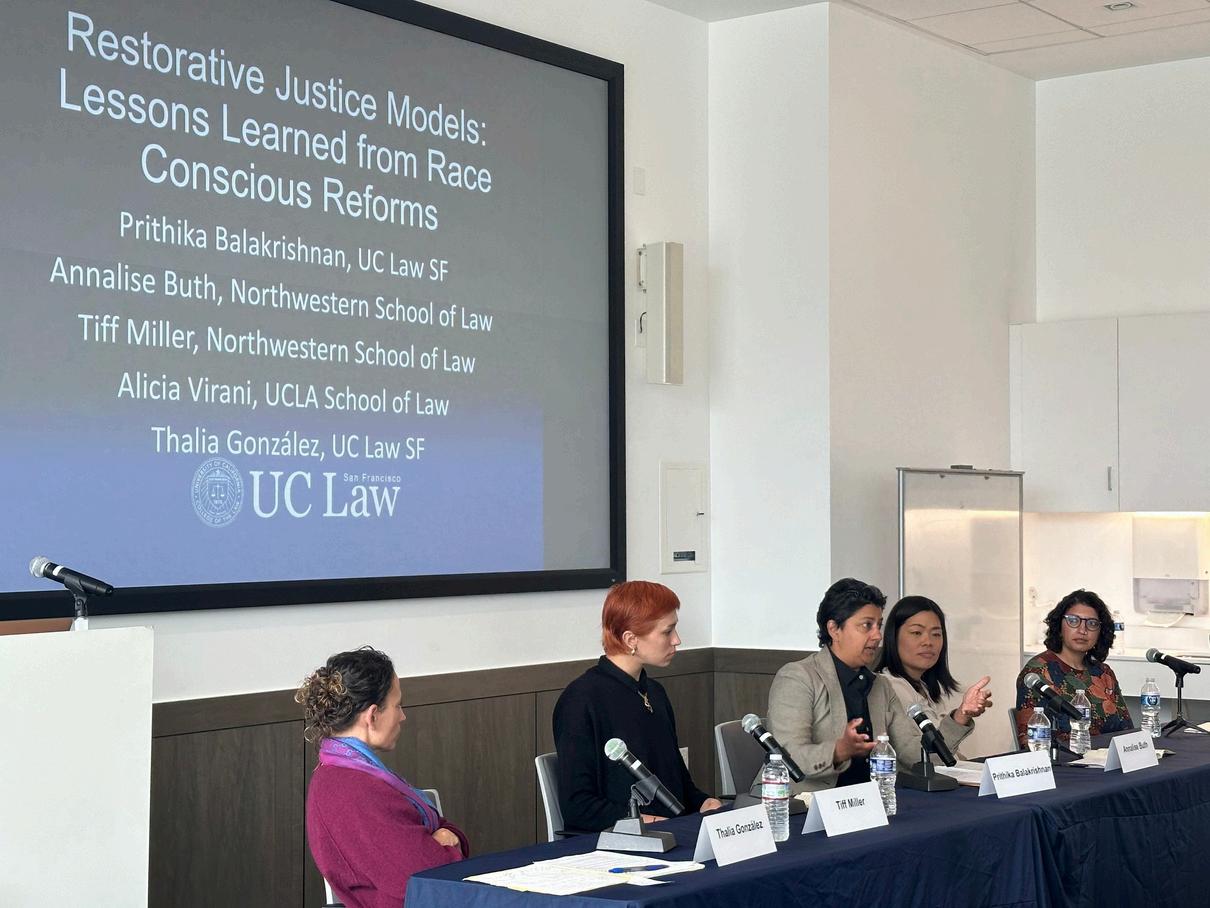
During his visit at UC Law, Professor Jerry López taught Rebellious Lawyering: Transforming Legal Education. This course, a sequence and extension of the American Legal Education course, challenged students to explore working with allies, mobilizing a robust campaign, adapting as to necessary feedback, and endlessly take stock of what they must next do in their collaborative efforts to change law schools as we know them.
Students also had the opportunity to lead valuable roundtable discussions with other community members at the Racial Justice Symposium.
"It was an incredible opportunity to envision a reformed law school alongside my social-justice oriented classmates and through the guidance of Professors Jerry López and Alina Ball in the Rebellious Lawyering seminar this Spring Participating in the CREJ symposium through the course enabled us not only to envision change but also to actively shape it. The overall experience was more than just a class it was about empowerment, advocacy, and a commitment to a more just and equitable legal system."
Sasha Nasir, Class of 2024
Students and faculty came together to discuss their commitment to racial and economic justice. The group discussed different classroom methodologies that would encourage dialogues critical of race, class, colonialism, and the law. Students shared how their personal identities and ideologies have shaped their experiences at UC Law and changes they wish to see on campus.
Professor Ascanio Piomelli a leader in clinical education, received the Ellmann Memorial Clinical Scholarship Award from the AALS Section on Clinical Education. The award honors law professors and scholars who have devoted their careers to clinical teaching and whose “written body of work evinces a concern for justice and a commitment to healing the world.”
For over 30 years at UC Law San Francisco, Piomelli has guided law students in practical learning experiences to promote justice. He joined UC Law SF in 1992 and helped establish UC Law SF’s in-house clinical program, now known as the Community Justice Clinics.

Piomelli’s scholarship focuses on social change lawyering, examining its complexities and advocating for collaborative approaches in which lawyers work alongside, rather than simply on behalf of, the clients and communities they serve. He teaches clinics that provide hands-on training for law students as they represent individuals (with issues such as employment disputes, disability insurance, and criminal record expungement) or work with activist groups to pursue progressive social change.
“Receiving the Ellmann Memorial Clinical Scholarship Award is a gratifying affirmation that my national peers believe my body of published work has made a lasting contribution to clinical legal education,” Piomelli said. “I hope the award will encourage faculty who aren’t yet familiar with my work to assign it in their classes, because social-justice-minded students and young lawyers are an important audience I’m trying to reach. I’m hoping to impact how they conceive and implement their lawyering, to introduce them to alternatives to conventional public interest lawyering.”
In June, UC Law announced eight experts in various fields would be joining the community as new faculty members and visiting assistant professors, including Professor Prithika Balakrishnan.
Drawing on over 10 years of experience as a public defender, Professor Balakrishnan focuses her research on the interlaced issues of criminal law, technology, and race. Most recently in a forthcoming paper, she explores how GPS monitoring of pretrial defendants is “radically changing the presumption of innocence” and “amplifying racial disparities” in the criminal justice system.
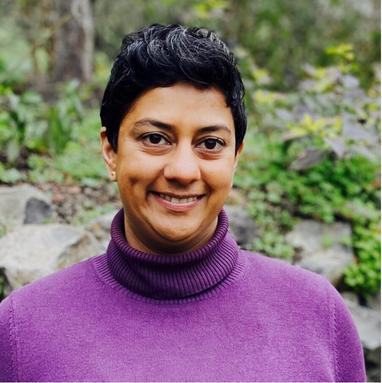
“Technology is something that has transformative effects and calls on us to evaluate what it is we truly hold as important,” she said. “As technologies progress, what is in the realm of the possible changes. And as a community, we must negotiate what to do with the new abilities that technology offers us.”
Balakrishnan has served as a visiting professor directing UC Law SF’s Criminal Practice Clinic since 2022, through a rotating professorship with the Center for Racial and Economic Justice. Balakrishnan, who earned her J.D. from Yale University, said she has enjoyed teaching “hardworking UC Law SF students who are dedicated to criminal justice” and looks forward to formally joining the College’s robust intellectual community of faculty members. She will continue teaching the Criminal Practice Clinic and will also teach Criminal Law to firstyear students starting in the 2024-2025 academic year.
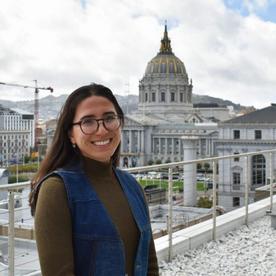
Vivyana Prado is a rising 3L at UC Law SF interested in land and energy justice As an undergraduate student at UCLA, she studied Environmental Science and Chicana/o Studies. She is a board member of the UC Environmental Law Association and the Indigenous Native American Law Student Association at UC Law SF. She is also colead an Alternative Spring Break trip through the Pro Bono center to provide immigration legal aid at the US/Mexico border in 2024 She has interned with the Natural Resources Defense Council (San Francisco) and the Sustainable Economies Law Center (Oakland) Prior to law school, she worked as a Program Associate at the Energy Foundation, a philanthropic environmental nonprofit, and as a tutor at the Latino Resource Organization in West Los Angeles. As a CREJ fellow, she assists with social media coordination and programming.
Megan Wilhelm is a graduating 3L. During her time at UC Law, Megan worked with Students for Immigrant Rights, the Disability Rights Association, and the Black Law Students Association. She has a passion for racial justice through policy advocacy and legislative drafting. Megan has worked with Public Advocates Inc as an Arc of Justice Summer Fellow where she worked on advancing social housing through equitable policy analysis and advocacy She has also worked with the San Francisco Truth, Justice, and Reconciliation Commission to bring reparations to displaced Black San Franciscans from the 1970s. With CREJ, Megan researched and designed racially conscious legal education plans for future law students.
